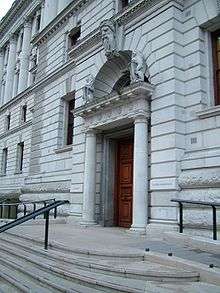National Infrastructure Commission
 | |
| Non-ministerial government department overview | |
|---|---|
| Formed |
5 October 2015 (as a non-ministerial government department) 27 October 2016 (as an executive agency of HM Treasury) |
| Jurisdiction | United Kingdom |
| Annual budget | Unknown |
| Non-ministerial government department executives |
|
| Parent Non-ministerial government department | HM Treasury |
| Website |
www |
The UK National Infrastructure Commission was established on 5 October 2015 as the non-ministerial government department responsible for providing expert advice to HM Government on the pressing infrastructure challenges facing the United Kingdom.[1] One of its main tasks is to undertake a national infrastructure assessment during each Parliament, make recommendations to the government and then monitor the government's response.
Chancellor George Osborne appointed Lord Adonis as interim chairman.[2] On 27 October the commission was established as an executive agency of HM Treasury.[3] On 21 April 2017, Lord Adonis and Sir John Armitt were confirmed as the first permanent chair and deputy chair respectively, and four new commissioners were appointed.[4] Lord Adonis resigned in December 2017 citing concerns over Brexit and was replaced by former Deputy Chair Sir John Armitt. [5]
Commissioners
- Sir John Armitt – serves as chair
- Dame Kate Barker
- Professor Tim Besley
- Professor David Fisk
- Andy Green
- Demis Hassabis
- Sadie Morgan
- Julia Prescot
- Bridget Rosewell[6]
Secretariat
As well as the commissioners, the commission has about 35 people who work in the secretariat: made up of civil servants, including economists and policy generalists, as well as secondees from industry.
National infrastructure assessment
One of its main tasks is to undertake a national infrastructure assessment each parliament, making recommendations to the Government and then hold the Government to account on implementation. It published the Interim National Infrastructure Assessment on 13 October 2017.[7]
Reports
As part of its work, the commission has published several reports on infrastructure in the UK as well as recommendations for its improvement.
Smart Power
The first report looked into the UK energy market, exploring how supply and demand can better be balanced as well as making recommendations for future infrastructure programs.[8][9]
Transport for a World City
The second report explored options for improving transport within and around the London area and strongly advocated the construction of Crossrail 2 as its main proposal.[10]
High Speed North
This report explored options for improving connectivity across the North of England. Options include High Speed 3, upgrades to the motorway network, investment in conventional railways and a new Trans-pennine Tunnel.[11]
Connected Future
Connected Future explored what the UK needs to do to become a world leader in 5G deployment and take early advantage of the potential applications of 5G services. The commission found that Britain was 54th in the world for 4G and that the UK government and the communications regulator, Ofcom, needed to ensure that essential outdoor mobile services, such as basic, text and data use, were available all across the UK. In anticipation of 5G, the UK had to improve mobile connectivity on railways, roads and in towns and cities.[12]
Future reports
In November 2016, the government asked the commission to conduct a new study on how technology can improve infrastructure productivity.[13]
References
- ↑ "Osborne launches National Infrastructure Commission". BBC News. British Broadcasting Corporation. 30 October 2015. Retrieved 25 March 2016.
- ↑ "About – National Infrastructure Commission – GOV.UK". gov.uk. Retrieved 2016-03-18.
- ↑ "The UK's first ever National Infrastructure Assessment enters new phase – National Infrastructure Commission".
- ↑ "Boost to National Infrastructure Commission's expertise – National Infrastructure Commission".
- ↑ https://news.sky.com/story/read-lord-adonis-letter-to-pm-in-full-as-labour-peer-quits-government-role-11188763
- ↑ "NIC commissioners".
- ↑ "Adonis: tackle the three Cs and deliver world-class infrastructure – National Infrastructure Commission".
- ↑ "SMART POWER" (PDF). 4 March 2016. Retrieved 2016-03-18.
- ↑ "Smart energy could save £8bn a year, say advisers". BBC News. British Broadcasting Corporation. 4 March 2016. Retrieved 25 March 2016.
- ↑ "TRANSPORT FOR A WORLD CITY" (PDF). 9 March 2016. Retrieved 2016-03-18.
- ↑ "HIGH SPEED NORTH" (PDF). 14 March 2016. Retrieved 2016-03-18.
- ↑ "Connected Future – Completed Study – National Infrastructure Commission".
- ↑ https://www.gov.uk/government/uploads/system/uploads/attachment_data/file/571940/161120_-_letter_for_Cx_and_TORs_for_the_tech_study_fv__003_.pdf
